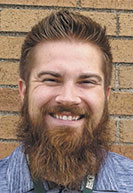Subscriber Benefit
As a subscriber you can listen to articles at work, in the car, or while you work out. Subscribe NowWith some grant money left over and families in need, the Marion Superior Court Probation Department decided to do another “give-back event.”
The department had used a $17,313 grant from the Annie E. Casey Foundation in 2020 to fill 750 bags with all the fixings to make a dinner, plus a game or puzzle families could enjoy together. It was intended to bring some fun during a time in the COVID-19 pandemic when many were living in isolation.
This year, the department kept getting requests from youth on probation and their families for toiletries and hygiene items. So, they used the remaining $9,500 from the grant and assembled a personal care package in 150 reusable blue canvas bags.
Each tote included a bottle of shampoo and a bottle of body wash, two deodorants, one to two bars of soap, one bottle of hand sanitizer and two wet wipes. Also tucked in were combs and a pair of black and gray Carhartt socks.
“Everybody needs it, everybody can benefit from it,” Kerl said of the products in the bags. “There’s never a time when you may not need a new pair of socks.”
The bags were distributed either by being dropped off when probation officers made home visits, or being offered to participants arriving at the family needs intervention space at the probation office.

Juvenile probation officer Nick Cox and his field partner grabbed a few of the bags one day and gave them to the families they visited.
“It was maybe a pleasant change from the normal home visit of just coming to check in and be nosy,” Cox said. “We’re actually not coming empty-handed for once.”
The bags, Cox and Kerl said, are meant to show that the probation officers want to help and support the youths and their families. Possibly, the unexpected gift could create a rapport, which could make the households more comfortable asking for help if they are having trouble affording groceries or paying a utility bill.
“I think it’s a good use of any excess funds that we may have had to help families that we have that are in need,” Cox said. “Even if it’s not directly going toward the child that’s involved with the system, maybe they have younger children in the home that benefited from these things. … Anything we can do to help the family as a whole is only going to help the child involved.”•
Please enable JavaScript to view this content.

